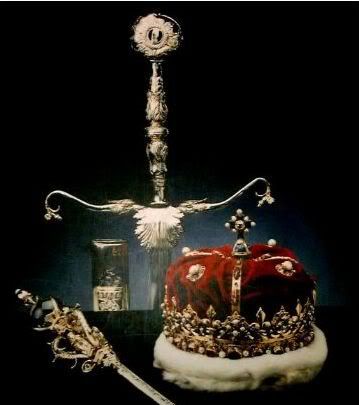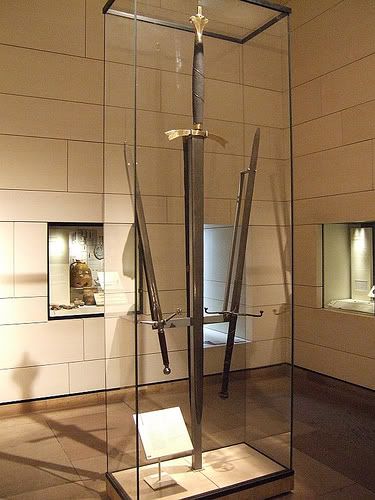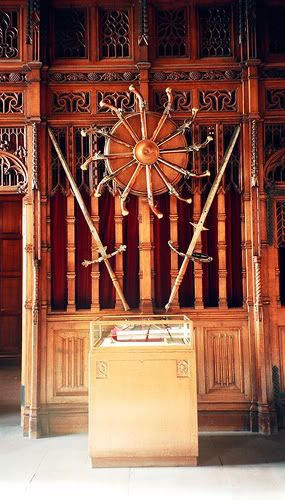
 |
|
|
#1 |
|
Member
Join Date: Mar 2009
Posts: 1,063
|
maybe we can get this fascinated weapon structured.
(in my house the twohanders are still a chaos, see pic.) Landsknecht two hander? 16thC fighting twohanders ? Stantler twohander ? when did the two hander became processional ? did they also fight with processional two handers? different flamberge blade types ? the beautiful Braunschweiger twohander? fishtailpommels? difference in swordstyles between countries looking forward to the reactions? best regards |
|
|

|
|
|
#2 |
|
Member
Join Date: Feb 2008
Location: Edinburgh, Scotland
Posts: 48
|
That`s one beautiful and rare collection you have there!
Great to see, and I would love to see some even closer details on some of these. Two handed swords have been used as procession swords for as long as they have been around. For official ceremony or parade, the two handed sword is a clear and mighty symbol of power, status and justice. There is however a difference between two handed swords made exclusively for ceremony and those made first for practical use that may also have been used for ceremony. From your photograph, all the swords shown there appear to be practical two handers, all crafted for practical martial use (and there`s a couple there that I bet fly nicely  ) )It is possible that these have been used as processional swords at some stage in their life, but without contextual provenance, is impossible to prove. Processional swords that are designed for ceremonial use firstly are evident by their form, dimensions or construction, which may all be outwith practical considerations and requirements. Ceremonial Form - The State Sword of Scotland is a good example of a sword hilt designed primarily for ceremonial use.  The blade is in fact a nicely forged and crafted piece that could be put to practical use if required, but the hilt is clearly ceremonial in nature. All hilt elements are elaborately designed and covered in gilt work. The quillions are nicely formed, yet too thin for practical design. The grip is also metal and of a form not designed with comfort and effective grip in mind. The pommel is also overly large and hollow, which lends a greater canvas for the craftsman to present his skills, but is not so practical for any fighting sword. Ceremonial Dimensions - To create the impression of an ultimate symbol of power and status, some swords were created primarily for ceremonial impression. The two handed sword presently on display at the Royal Museum of Scotland at Chambers Street, Edinburgh, is a fitting example of this (centre of image below).  This is a sword crafted in traditional form, but excessive dimensions. Note the Highland two hander and Lowland two hander on each side. The Highland sword has a blade length of approx. 40", which by scale give the ceremonial sword an overall length well in excess of 80"! This is one huge piece, with the blade as broad as your hand. The sword is well made, with a nice blade in fact, but far too large for any practical use. Ceremonial Construction - In the Great Hall of Edinburgh Castle there are many swords. A great many original basket hilts and early sabres, one questionable Highland two hander, and two large pieces that at first glance appear to be nicely made German zweihanders.  The swords are of traditional form and dimensions, but closer inspection reveals their true nature. The blades are excessively thick at the forte and down the length of the blade, indicating a blade weight outwith practical considerations. The grip and pommel are also carved from the same piece of wood. Aye, you heard it right, wooden pommels! This confirms that these swords are created firstly to look the part, most likely for ceremonial use. Another possibility exists, that these swords may have been created simply to look the part for a castle or stately home great hall in the C19th, given the gothic revival at this time. Only a closer study to period of manufacture could suggest further or otherwise. With regard to ceremonial two handers however, I hope that the above observations might be helpful in your research. All the best, Macdonald |
|
|

|
|
|
#3 |
|
Member
Join Date: Mar 2009
Posts: 1,063
|
Hi Paul,
I just noticed your very valuable information and pictures, especially the two handers in the great hall of Edinburgh's castle are very interesting. thanks a lot  regards from Holland |
|
|

|
|
|
#4 |
|
Member
Join Date: Mar 2009
Posts: 1,063
|
.
Last edited by cornelistromp; 9th June 2009 at 08:27 PM. |
|
|

|
|
|
#5 |
|
Member
Join Date: Mar 2009
Posts: 1,063
|
.
|
|
|

|
|
|
#6 |
|
Member
Join Date: Mar 2009
Posts: 1,063
|
.
|
|
|

|
|
|
#7 |
|
Member
Join Date: Dec 2004
Location: Madrid / Barcelona
Posts: 256
|
Just because there's a piece I know that looks similar to one of those... What's the bibliographical reference for this picture? Thanks in advance

|
|
|

|
|
|
#8 | |
|
Member
Join Date: Mar 2009
Posts: 1,063
|
Quote:
that must be a nice piece then  Inventar der Waffensammlung des Bernischen Historischen Museums in Bern by DR. Rudolf Wegeli 1929 II Schwerter und Dolche (swords and daggers) I think it will be very hard (read impossible) to find this book. if you give me the nr I will mail you the description. (in German, I can translate for you if you want) Regards from Amsterdam |
|
|
|

|
|
|
#9 |
|
(deceased)
Join Date: Dec 2004
Location: Portugal
Posts: 9,694
|
The one in the Oporto Military Museum.
. |
|
|

|
|
|
#10 | |
|
Member
Join Date: Dec 2004
Location: Madrid / Barcelona
Posts: 256
|
Quote:
 Thank you, I really appreciate your kindness. The item in question is number 177. A translation from German would also indeed be extremely helpful, if it's not much of a nuisance... Thank you very much again, Marc |
|
|
|

|
|
|
#11 |
|
Member
Join Date: Mar 2009
Posts: 1,063
|
sword, early 16thC
in the wide flat blade with roof shaped edge and smaller till the middle reaching fullers are 4 marks in messing. 1 and 1/2 hander straight round thin guards with fig shaped terminals, 2 flat ring guards with pierced plates, grip with robe wired and covered with punched leather clothing, fig shaped pommel with round tang knob. best regards |
|
|

|
|
|
#12 |
|
(deceased)
Join Date: Sep 2008
Location: Bavaria, Germany - the center of 15th and 16th century gunmaking
Posts: 4,310
|
Enjoy.
Michael |
|
|

|
|
|
#13 | |
|
Member
Join Date: Mar 2009
Posts: 1,063
|
Quote:
HermannH 19MAI 2001 LOS 64 I missed this beautiful one.  Best regards |
|
|
|

|
|
|
#14 |
|
(deceased)
Join Date: Sep 2008
Location: Bavaria, Germany - the center of 15th and 16th century gunmaking
Posts: 4,310
|
Brilliant, man!
Well, nobody can get everything ...   m |
|
|

|
|
|
#15 | |
|
Member
Join Date: Dec 2004
Location: Madrid / Barcelona
Posts: 256
|
Quote:

|
|
|
|

|
|
|
#16 |
|
Member
Join Date: Mar 2009
Posts: 1,063
|
.
|
|
|

|
|
|
#17 |
|
Member
Join Date: Apr 2007
Location: Nothern Mexico
Posts: 458
|
Very good thread, Cornelis, and thank you all for this valuable visual material.
Regards Gonzalo |
|
|

|
|
|
#18 |
|
Member
Join Date: Dec 2009
Posts: 26
|
Is there any existing classification of the flamberge blades?
As I understood, on sight all of them fall in two different types, and the difference between them lies in the method of making the waves - first type is a "snake-like" (when the the whole body of the blade was made waved, which is clearly shown at the example from the first post), and the second is "saw-like" (when the body of the blade was of it's usual shape with the saw-like edge, like those shown at the book and the perfect one from the last post by cornelistromp). |
|
|

|
|
|
#19 |
|
Member
Join Date: Mar 2009
Posts: 1,063
|
the largest medieval sword that I am aware of.
even greater then the huge sword in the Tower of London. allover length 270cm, blade 205cm x 10cm ,cross 66cm , pommel 13cm. topkapi Museum Istanbul. Last edited by cornelistromp; 20th June 2012 at 08:34 AM. |
|
|

|
|
|
#20 |
|
Member
Join Date: Mar 2009
Posts: 1,063
|
great medieval swords in tower of London.
|
|
|

|
|
|
#21 |
|
(deceased)
Join Date: Sep 2008
Location: Bavaria, Germany - the center of 15th and 16th century gunmaking
Posts: 4,310
|
Oh yes, Jasper,
They are HUGE, 7 ft. long I think. Must have been bearing or processional swords. Best, m Last edited by Matchlock; 20th June 2012 at 02:07 PM. |
|
|

|
|
|
#22 |
|
(deceased)
Join Date: Dec 2004
Location: Portugal
Posts: 9,694
|
Pardon my ignorance, Gentlemen
 . .Why do you/we call these 'things' swords and not (decorative, symbolic,ritual ... you name it)) objects with the shape/form of swords ? ... For the sake of the term meaning  . .... As surely you will not go out and do any 'swording' with them  . .
|
|
|

|
|
|
#23 | |
|
Member
Join Date: Mar 2009
Posts: 1,063
|
Quote:
not suitable for a man to man combat, but it'll be very impressive and intimidating. about the exact function of those swords the learned gentlemen still disagree. best, |
|
|
|

|
|
|
#24 |
|
(deceased)
Join Date: Sep 2008
Location: Bavaria, Germany - the center of 15th and 16th century gunmaking
Posts: 4,310
|
Please also check out the valuable contributions in
http://www.vikingsword.com/vb/showthread.php?t=15290 m |
|
|

|
|
|
#25 |
|
Member
Join Date: Nov 2010
Location: Wirral
Posts: 1,204
|
This is my two hander for what its worth. It's approx 150 cm long , the blade is in very poor condition so as the hilt is very good I assume that the two got togther at a later date . The blade is remarkably flexible and exhibits none of the stiffness that I associate with these large swords .
|
|
|

|
|
|
#26 |
|
(deceased)
Join Date: Dec 2004
Location: Portugal
Posts: 9,694
|
Hi Richmond,
Can we have a close(r) picture of the hilt. ... If you don't mind, of course 
|
|
|

|
|
|
#27 | |
|
Member
Join Date: Nov 2010
Location: Wirral
Posts: 1,204
|
Quote:
Last edited by thinreadline; 26th June 2012 at 03:47 PM. |
|
|
|

|
|
|
#28 |
|
(deceased)
Join Date: Sep 2008
Location: Bavaria, Germany - the center of 15th and 16th century gunmaking
Posts: 4,310
|
Hi Richmond,
The ornamental style of the carvings on the hilt seems to point towars ca. 1560, based on the acanthus leaves, although the profuse piercings would suggest somewhat earlier stylistic aesthetics of ca. 1530. The irregular corrosion of the blade reminds me of swords salvaged from tombs, showing heavy rust only in places that were in close contact with the body. As to the flexibility of the blade I can tell by experience that blades of two-handed swords are far from being stiff; they are highly flexible instead. Best, m |
|
|

|
|
|
#29 |
|
Member
Join Date: Mar 2009
Posts: 1,063
|
the flexible blade seems very good, I see this more often on two handers. The hilt is beautiful but it seems to me 19thC, although Italians also have created this kind of artwork in the 16th century.
best, |
|
|

|
|
|
#30 | |
|
(deceased)
Join Date: Dec 2004
Location: Portugal
Posts: 9,694
|
Quote:
... But again, my opinion is worthless  . .
|
|
|
|

|
 |
| Thread Tools | Search this Thread |
| Display Modes | |
|
|